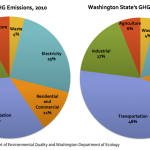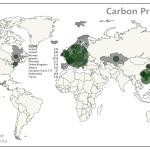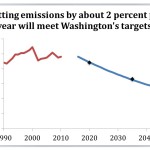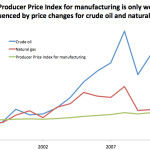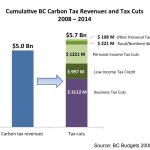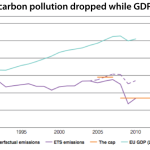Search Results
-
The Ongoing Coal Export Collapse at BC’s Ridley Terminal
Coal exports from the Ridley terminal on the north British Columbia coast are continuing their free-fall. In November, the terminal reported some of the lowest coal export volumes since the depths of the global recession in 2009. It’s not just a one-month blip: exports at the terminal have been falling in fits and starts since late last year. Ridley’s shipments of “thermal” coal—the grade of coal burned in overseas power plants—have been...Read more » -
Event: Carbon Pricing Options for Oregon
Carbon Tax vs. Cap and Trade? Can Oregon make polluters pay and grow jobs? How will low-income communities be affected? Where should the revenue go? This Monday, join our senior researcher Kristin Eberhard to talk about carbon pricing options for Oregon. A wonderful panel of speakers will lay out smart climate policy solutions towards reducing Oregon’s carbon pollution. Oregon has an opportunity to be a critical leader on carbon pricing...Read more » -
Why Price Carbon—Can’t We Just Regulate It?
Most Americans—including most Republicans—want to regulate carbon pollution. Oregon and Washington have already set legally binding limits on the climate-changing gas. Next, climate change warriors in Olympia and Salem are trying to make those limits enforceable. They’re considering hard emissions caps enforced through limited permits and complemented by an array of targeted policies. But what if Oregon and Washington’s lawmakers fail to insert sharp incisors in their beyond-carbon rules? Desperate...Read more » -
All the World’s Carbon Pricing Systems in One Animated Map
Oregon and Washington leaders are contemplating turbocharging their clean energy transition by instituting carbon pricing here in the Pacific Northwest. Will a cap or tax on carbon work? Has anyone else ever done this before? Why, yes. Since you ask: Scandinavian countries have been pricing carbon for more than two decades. The European Union Emissions Trading System (EU ETS) has been pricing carbon for almost a decade. US states and...Read more » -
The #1 Question from Progressives about Revenue-Neutral Carbon Taxes
Last time, I shared the #1 question from conservatives about revenue-neutral carbon taxes like the Carbon Washington proposal to implement a BC-style carbon tax and use the revenue to cut sales taxes and business taxes: How do you know it’s going to stay revenue-neutral? This time I’d like to share with you the #1 question from progressives about revenue-neutral carbon taxes: How do you know it’s going to stay revenue-neutral?...Read more » -
Carbon Pricing and Northwest Businesses

Data sources: Prices for crude oil (U.S. first purchase price) and natural gas (industrial price) from EIA; Producer Price Index (for total manufacturing industries) from BLS. Original Sightline Institute graphic, available under our free use policy.
Many business owners and workers worry that carbon pricing will hurt local economies. They need to know: How would carbon pricing affect businesses and job creation in Washington and Oregon? In particular, how would it affect energy-intensive businesses that compete in national and international markets with companies not yet covered by carbon pricing? Will these energy-intensive, trade-exposed (EITE) businesses, like steel and aluminum manufacturing, still be able to compete with...Read more » -
Why Washington State Should Adopt a BC-style Carbon Tax
Editor’s Note: Washington’s Carbon Emissions Reduction Taskforce is on the job, weighing alternative carbon-pricing proposals. Some members of the panel have asked what our ideal policy would be for Washington State. Yoram Bauman shares his thoughts today. Alan Durning will share his argument for a California-style cap-and-trade system, with key modifications, another day. If I had my druthers, Washington State would push for a BC-style revenue-neutral carbon tax. Full disclosure:...Read more » -
Four Carbon Pricing Pitfalls to Avoid

European carbon pollution dropped while GDP rose. by Environmental Defense Fund (Used with permission.)
Despite its widely discussed woes, every year the European Union Emissions Trading System (EU ETS) cuts more carbon pollution than the entire state of Oregon spits out. That’s no small feat. The EU cap-and-trade program limits carbon dioxide emissions from more than 11,000 power stations and industrial plants in 31 participating countries, covering 45 percent of the EU’s total greenhouse gas (GHG) emissions. The market has operated for nearly a...Read more » -
The Ingredients for Pro-Kid Cities
Former Seattle Planning Commissioner Sarah Snider Komppa spent months visiting and comparing 10 North American cities to answer the following questions: What makes dense urban areas attractive to kids and parents? Why do some give up and move to the suburbs? What are the necessary ingredients to support families living downtown? What policy changes do we need to make? Komppa took the time to answer some questions about what her...Read more » -
Murray Compromise Lifts Seattle Rideshare Caps
With everyone facing something to lose, representatives from Seattle’s new(ish) ‘rideshare’ industry stood alongside vehicle-for-hire owners and taxi owners and drivers Monday to announce a compromise brokered by Seattle Mayor Ed Murray that they all can apparently live with. It’s a big win for companies like Lyft and UberX, which could operate with no caps on their numbers of drivers and grow as fast as the market demands. It also...Read more »


